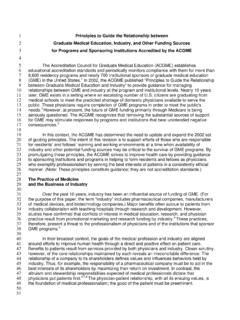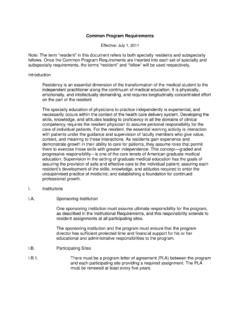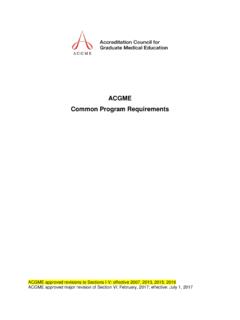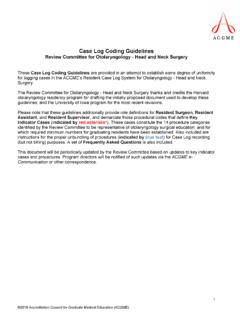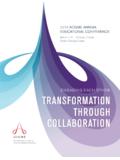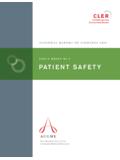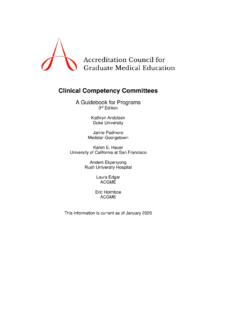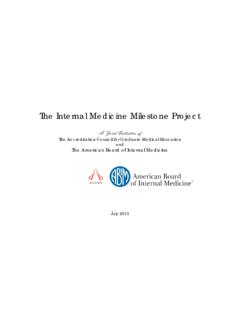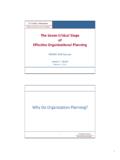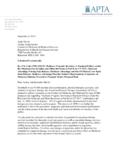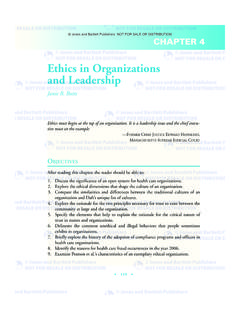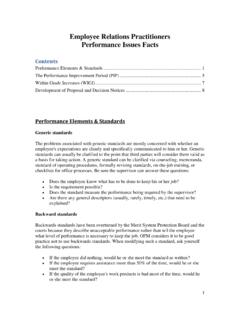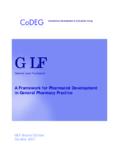Transcription of October 2015 - ACGME
1 The Family Medicine Milestone Project A Joint Initiative of The Accreditation Council for Graduate Medical Education and The American Board of Family Medicine October 2015 i The Family Medicine Milestone Project The Milestones are designed only for use in evaluation of resident physicians in the context of their participation in ACGME accredited residency or fellowship programs. The Milestones provide a framework for the assessment of the development of the resident physician in key dimensions of the elements of physician competency in a specialty or subspecialty. They neither represent the entirety of the dimensions of the six domains of physician competency, nor are they designed to be relevant in any other context. ii Family Medicine Milestones Working Group Chair: Suzanne Allen, MD Tanya Anim, MD Eileen Anthony, MJ David Araujo, MD Diane Beebe, MD Julie Dostal, MD Tricia Elliott, MD Larry A. Green, MD Amy L.
2 McGaha, MD Richard Neill, MD Steve Nestler, PhD Perry Pugno, MD, MPH Martin Quan, MD Adam J. Roise, MD, MPH Allen F. Shaughnessy, PharmD, MMedEd Penelope Tippy, MD 3 FAMILY MEDICINE MILESTONES PROLOGUE Family medicine contributes to the care of patients at all levels, throughout all stages of life, and is more than a primary care specialty. It is a discipline characterized by its breadth and integrative functions. Family physicians are personal physicians who focus on each individual in his or her given situation, integrating mental and physical health, within each individual s own social context. These physicians possess a unique skill-set to take primary responsibility for and manage any problems with which patients present for attention and care . They provide a reliable point of first contact with the health care system for patients, regardless of the type or nature of their problems, providing a comprehensive set of services that resolve most of the problems the majority of people have most of the time.
3 They remain with their patients across time and health care settings, and work with dynamic teams to integrate proper care of individuals. Family physicians interface with all medical specialties and public health. When necessary, they rely on community resources, helping individuals, families, and communities meet their health-related goals. The special focuses of family physicians are the individual in the context of his or her family and community, and all the complexities this entails. It is essential for family physicians to have in-depth knowledge of a patient as an individual and broad knowledge of medical science to act in the best interest of that patient. The effectiveness of family physicians depends on their abilities to earn the trust of their patients and sustain relationships over time. Because of the breadth of involvement of family medicine in the health care system, family physicians are in a special position to critique, positively influence, and lead the health care delivery system.
4 Family medicine residency programs aim to graduate physicians with the necessary attitudes, knowledge, and skills to serve any and all of the nation s communities. The Family Medicine Milestones document is a living document that provides guidance for how family physicians are developed from the start of residency as undifferentiated medical students, to becoming competent family physicians ready to enter independent practice. The milestones are developmentally-based family medicine-specific attributes that family medicine residents can be expected to demonstrate as they progress through their programs. Organized around the six ACGME core competencies, each group of related milestones includes an introductory statement that describes the specific emphasis of family medicine within that competency. 4 Milestone Reporting This document presents milestones designed for programs to use in semi-annual review of resident performance and reporting to the ACGME .
5 Milestones are knowledge, skills, attitudes, and other attributes for each of the ACGME competencies, organized in a developmental framework from less to more advanced. They are descriptors and targets for resident performance as a resident moves from entry into residency through graduation. In the initial years of implementation, the Review Committee will examine milestone performance data for each program s residents as one element in the Next Accreditation System (NAS) to determine whether residents overall are progressing. For each reporting period, review and reporting will involve selecting the level of milestones that best describes each resident s current performance level in relation to milestones. Milestones are arranged into levels. Selection of a level implies that the resident substantially demonstrates the milestones in that level, as well as those in lower levels (see Reporting Form diagram below). A general interpretation of Milestone levels for family medicine is below: Level 1: The resident demonstrates milestones expected of a resident who has had some education in family medicine.
6 Level 2: The resident is advancing and demonstrating additional milestones. Level 3: The resident continues to advance and demonstrate additional milestones; the resident consistently demonstrates the majority of milestones targeted for residency. Level 4: The resident has advanced so that he or she now substantially demonstrates the milestones targeted for residency. This level is designed as the graduation target. Level 5: The resident has advanced beyond performance targets set for residency and is demonstrating aspirational goals which might describe the performance of someone who has been in practice for several years. It is expected that only a few exceptional residents will reach this level. 5 Additional Notes Level 4 is designed as the graduation target but does not represent a graduation requirement. Making decisions about readiness for graduation is the purview of the residency program director (See the Milestones FAQ for further discussion of this issue: Can a resident/fellow graduate if he or she does not reach every milestone?)
7 Study of Milestone performance data will be required before the ACGME and its partners will be able to determine whether Level 4 milestones and milestones in lower levels are in the appropriate level within the developmental framework, and whether Milestone data are of sufficient quality to be used for high stakes decisions. Some milestone descriptions include statements about performing independently. These activities must occur in conformity to the ACGME supervision guidelines, as well as to institutional and program policies. For example, a resident who performs a procedure independently must, at a minimum, be supervised through oversight. Answers to Frequently Asked Questions about Milestones are available on the Milestones web page: ACGME Report Form The diagram below presents an example set of milestones for one sub-competency in the same format as the milestone report worksheet. For each reporting period, a resident s performance on the milestones for each sub-competency will be indicated by.
8 Selecting the level of milestones that best describes the resident s performance in relation to the milestones or, selecting the Has not Achieved Level 1 option MK-2 Applies critical thinking skills in patient care Has not achieved Level 1 Level 1 Level 2 Level 3 Level 4 Level 5 Recognizes that an in - depth knowledge of the patient and a broad knowledge of sciences are essential to the work of family physicians Demonstrates basic decision making capabilities Demonstrates the capacity to correctly interpret basic clinical tests and images Synthesizes information from multiple resources to make clinical decisions Begins to integrate social and behavioral sciences with biomedical knowledge in patient care Anticipates expected and unexpected outcomes of the patients clinical condition and data Recognizes and reconciles knowledge of patient and medicine to act in patients best interest Recognizes the effect of an individual s condition on families and populations Integrates and synthesizes knowledge to make decisions in
9 Complex clinical situations Uses experience with patient panels to address population health Integrates in -depth medical and personal knowledge of patient, family and community to decide, develop, and implement treatment plans Collaborates with the participants necessary to address important health problems for both individuals and communities Comments: Selecting a response box in the middle of a level implies that milestones in that level and in lower levels have been substantially demonstrated. Selecting a response box on the line in between levels indicates that milestones in lower levels have been substantially demonstrated as well as some milestones vi in the higher level(s). Version 10/ 2015 Copyright 2013 The Accreditation Council for Graduate Medical Education and The American Board of Family Medicine. All rights reserved. The copyright owners grant third parties the right to use the Family Medicine Milestones on a non-exclusive basis for educational purposes.
10 1 FAMILY MEDICINE MILESTONES ACGME Report Worksheet PATIENT care Family physicians provide accessible, quality, comprehensive, compassionate, continuous, and coordinated care to patients in the context of family and community, not limited by age, gender, disease process, or clinical setting, and by using the biopsychosocial perspective and patient-centered model of care . PC-1 Cares for acutely ill or injured patients in urgent and emergent situations and in all settings Has not achieved Level 1 Level 1 Level 2 Level 3 Level 4 Level 5 Gathers essential information about the patient (history, exam, diagnostic testing, psychosocial context) Generates differential diagnoses Recognizes role of clinical protocols and guidelines in acute situations Consistently recognizes common situations that require urgent or emergent medical care Stabilizes the acutely ill patient utilizing appropriate clinical protocols and guidelines Generates appropriate differential diagnoses for any presenting complaint Develops appropriate diagnostic and therapeutic management plans for acute conditions Consistently recognizes complex situations requiring urgent or emergent medical care Appropriately prioritizes the response to the acutely ill patient Develops appropriate diagnostic and therapeutic management plans for less common acute conditions Addresses the psychosocial implications of acute illness on patients and families Arranges appropriate transitions of care Coordinates care of acutely ill patient with consultants and community services Demonstrates awareness of

